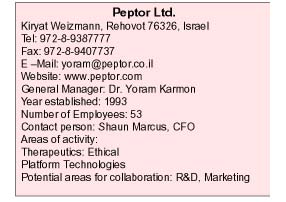Elias claims Peptor's treatment is at least two years ahead of competing medications.
Peptor is negotiating partnerships with leading international drug manufacturers for clinical trials it wants to hold in Europe
and the U.S. The partnerships could lead to strategic investments.
World Health Organization figures show that diabetes is the seventh most prevalent cause of mortality in humans. Over
150 million people worldwide suffer from the disease.
The number of diabetes patients has increased substantially in the last 25 years, possibly due to changes in diet. There
are now over 50 million diabetes patients in North America, Japan and Europe, of whom 10 million could benefit from the
new Peptor development.
The company has begun the second phase of the clinical trials of the DiaPep2777 in the U.S. in early 2002. Third-phase
trials will begin in mid-2002.
Peptor is conducting five international multi-center phase II studies in type 1 diabetes patients as well as one international
multi-center phase II in LADA patients. These studies are designed to test the safety and efficacy of DiaPep277*.
Peptor plans to apply for FDA approval of the drug in 2004, and to launch the commercial distribution of it in 2005. A
similar schedule is planned for the drug in Europe.
To date, nineteen issued United States patents, five granted European patents (as well as all of their additional foreign
counterparts) and seven Israeli patents are either owned by or assigned to Peptor Ltd., or licensed exclusively to Peptor.
These patents claim all of Peptor's technologies and products in development, includingDiaPep277*, Somatoprim and
others as well as the processes for generating them.
Peptor, founded by Yoram Karmon, PhD, now its president and CEO, employs 41 people at its R&D center in Rehovot
and seven in Germany.
Since its establishment in 1993 Peptor has raised a total of $65 million. Its last funding round was in November 1999,
when it secured $15 million at a post-money company value of $70 million.
Shareholders include Teva Pharmaceuticals (Nasdaq:TEVA), Johnson & Johnson (NYSE:JNJ), Citibank, Clal
Biotechnology Industries, Nomura, Walden Israel, and the British 3i group.
The company planned to go public in Europe during 2000, at a company value of $115 million to $300 million. It shelved
its plan after the market crash.
Autoimmune Diabetes
Peptor's approach to autoimmune diabetes is based on understanding how the immune system attacks the
insulin-producing beta-cells of the pancreas and the hsp60 protein's role in that process. In experimental models,
Professor Irun Cohen and Doctor Dana Elias at the Weizmann Institute found a link between an hsp60 epitope and type 1
diabetes. Peptor has used this hsp60 epitope to develop DiaPep277* as a potential therapy for autoimmune diabetes. The
Company's research indicates that DiaPep277* triggers regulatory T cells. These T cells secrete anti-inflammatory natural
hormones, referred to as cytokines, that can turn off the misdirected immune cells, thereby stopping their attack and
destruction of healthy beta-cells. The Company's research in animal models has shown a significant reduction in
inflammation of the pancreas with continued insulin production, suggesting that the progression of the disease could be
prevented. This change in the immune response is diabetes-specific, suggesting that the development of a disease-specific
vaccine that re-educates the human immune system without immunocompromise is possible.
The company intends to target DiaPep277* for the treatment of newly diagnosed and established type 1 diabetes patients
as well as LADA patients.
Peptor engages in the development of novel therapeutic vaccines for the treatment of human autoimmune diseases and
cancers. Peptor bases its therapeutic approach on two platforms: (1) a class of proteins, known as heat shock proteins,
that are able to modulate the immune system to reduce and/or eliminate its destructive effects against the body's own cells,
and (2) proprietary technology to design, synthesize and screen large numbers of compounds for the discovery of novel
therapeutics, referred to as SCAPL technology.
Peptor's lead product, DiaPep277, is in phase II of human clinical trials for the treatment of autoimmune diabetes. Peptor
has several other compounds undergoing pre-clinical studies and research for the treatment of other autoimmune
diseases, such as myasthenia gravis and rheumatoid arthritis. Initiated collaborations with a discovery programmed that
focuses on the autoimmune aspects of atherosclerosis and development for the treatment of various forms of cancers.
Peptor estimates a massive market for its drug for the treatment of juvenile diabetes, or type 1 diabetes.
Dr. Dana Elias, VP Research and Development at Peptor, estimates that sales could reach between $1 billion to $2 billion
a year by 2007 or 2008.
Peptor's treatment helps to preserve insulin-producing cells and reduces the frequency of injected insulin supplements.
Diabetes is a potentially life threatening medical condition which impairs the body's metabolic control of blood sugar
levels. Diabetes is characterized by the body's inability either to produce insulin (type 1 diabetes) or to respond to insulin
(type 2 diabetes). Insulin is a hormone produced by the pancreas that controls the blood sugar levels. Recently, it has
been increasingly accepted by clinicians that there are two distinct clinical conditions that result in insulin dependent
diabetes. Type 1 diabetes is a well-known disease that begins either during childhood, adolescence or during early adult
life. The second, type 2 diabetes, is characterized by several subtypes, one of which is latent autoimmune diabetes of the
adult ("LADA"), a recently defined subpopulation. Both type 1 diabetes and LADA are autoimmune diseases in which the
insulin-producing beta-cells of the pancreas are attacked and destroyed by the body's own immune system. Peptor
believes that these attacks on beta-cells can be prevented or stopped by re-educating the immune system. Peptor's
objective is to achieve this re-education process in a diabetes-specific manner without using general
immunosuppressants that compromise the immune system of the patient.
